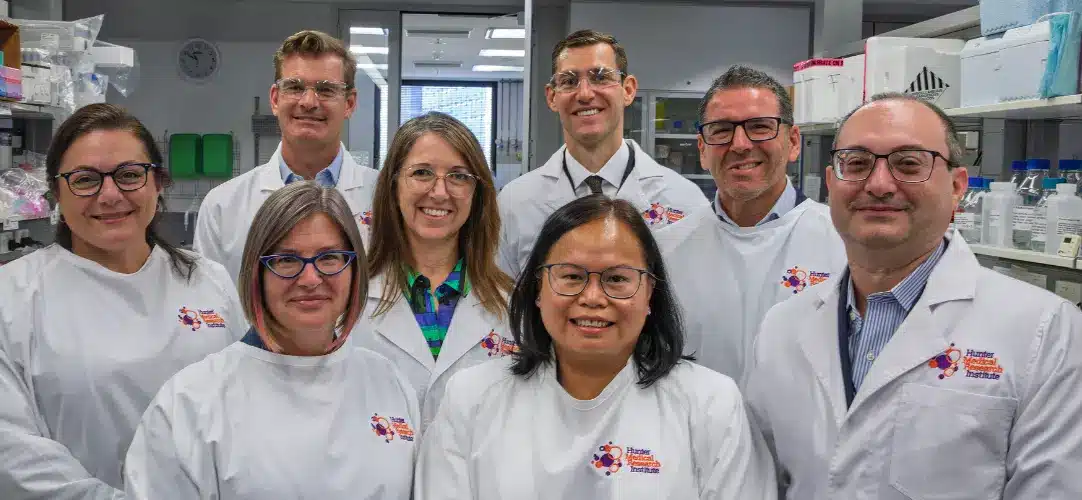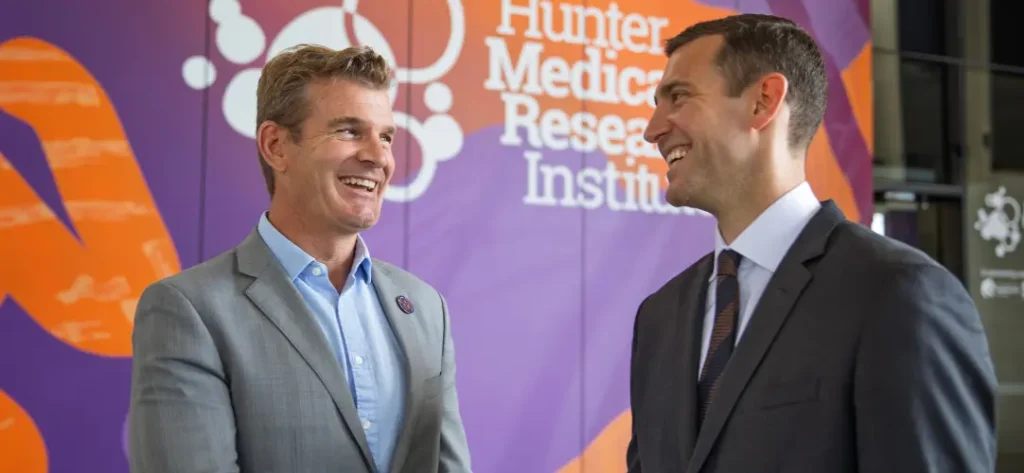
Strategic Research Partnership – HMRI and Novartis have signed an MoU to accelerate innovative medical research, combining their expertise to drive impactful healthcare projects.
Focus on Cardiovascular Health – The collaboration will prioritize lipid management and cardiovascular disease, integrating digital tools and patient education to improve outcomes.
Steering Committee for Impact – A joint committee will guide research priorities, ensuring projects are scientifically rigorous and deliver real-world benefits, especially in regional areas.
The Hunter Medical Research Institute (HMRI) is pleased to announce a new partnership with Novartis Australia, formalised through a Memorandum of Understanding (MoU), supported by collaboration with the University of Newcastle.
This agreement sets the foundation for future collaboration between HMRI and Novartis, allowing both organisations to work closely to discuss and plan potential research projects that will have a significant impact on healthcare outcomes.
The MoU represents a strategic commitment to fostering innovative medical research, leveraging HMRI and University of Newcastle expertise in world-class research and Novartis’ leadership in pioneering medical solutions. By working together, both organisations will explore opportunities to develop projects that align with their shared vision of advancing medical science and improving patient care.
Matt Zeller, Country President, Novartis Australia and New Zealand believes the partnership is an important step for patients.
“We are always looking for opportunities to collaborate with research institutions to push the boundaries of medical science. This MoU with HMRI provides an important platform to help identify and advance new research projects that could have a lasting impact on patients.”
“Cardiovascular disease is still the leading cause of death in Australia, and we must be willing to work together, across the ecosystem, to try new things and see what can actually reduce the burden on communities, patients, and their families. The collaboration will enable us to develop and test new models of care and new approaches to data and patient management that could then be scaled beyond the Hunter.”
“This integrated approach reflects a commitment to addressing complex health challenges through collaboration and interdisciplinary research,” Zeller said.
HMRI’s Institute Director and CEO, Professor Frances Kay-Lambkin, emphasised the potential impact of the relationship.

“This partnership allows our HMRI affiliated researchers, University of Newcastle experts and clinicians to deliver life changing innovations at a speed unmatched in Australia, if not the world. Our deep connection to the community enables us to rapidly translate laboratory breakthroughs into practical healthcare solutions.”
“Traditionally, it can take up to 17 years for research discoveries to make it from the lab to the hands of clinicians. Collaborations like this with Novartis provide the additional funding, resources, and linkages needed to significantly shorten that timeline, directly benefiting patients and the broader community.”
Beyond the initial focus on lipid management and cardiovascular health, the MoU is designed to support a long-term research partnership. HMRI’s Chief Research Partnerships Officer, Todd Williams, highlighted the importance of this collaboration in driving medical research forward.
“This MoU is an exciting step forward for HMRI and Novartis, with our existing strengths in working with the University, as it gives a structured way for us to collaborate on impactful research projects. By bringing together our combined expertise, we have a unique opportunity to develop and implement research that can lead to real improvements in patient outcomes.”
“The Novartis investment not only transforms the health and wellbeing of our communities but also provides industry with a meaningful way to invest and see a tangible return while doing good for the one million people across the Hunter New England region,” he added.
Steering committee to drive research focus like no other
A key feature of this agreement is the establishment of a steering committee, tasked with responsibility for identifying and prioritising research initiatives under the partnership. This committee will play a crucial role in deciding which projects should be pursued, how they should be structured, and what steps need to be taken to bring them to fruition.
The steering committee will consist of experts from Hunter Medical Research Institute and Novartis; ensuring that each project is scientifically rigorous, strategically aligned, and practically achievable. This structure provides a clear framework for decision-making and ensures that all projects undertaken under the MoU are well-positioned to deliver real-world impact.
Cardiovascular disease experts, University of Newcastle’s Professor Aaron Sverdlov and Professor Doan Ngo, will lead a project that initially focuses on lipid management and cardiovascular health.
Professor Aaron Sverdlov, who is the Director of Heart Failure at the University of Newcastle & Hunter New England Local Health District and a member of HMRI’s Heart and Stroke Research Program, believes tackling lipid management is a critical modifiable risk factor.
“Lipid disorders are a silent killer. High cholesterol often goes unnoticed until it has already caused significant damage, leading to heart attacks, strokes, and other vascular diseases. Through this initiative, we aim to establish best-practice management for lipid disorders, ensuring patients have access to early intervention, lifestyle support, and medical treatments that can significantly reduce cardiovascular risk. By integrating digital tools, dedicated clinics, and improving patient and provider education, we can take a proactive approach to cardiovascular disease prevention.”
Professor Doan Ngo, the Co-Director of HMRI’s Heart and Stroke Research Program, says the partnership is uniquely positioned to transform regional healthcare services.
“This collaboration with Novartis is a model for how industry, health services, research institutions, and universities can come together to address a critical healthcare challenge. In regional and rural areas like the Hunter New England Local Health District, patients often have poorer access to lipid management services, contributing to worse cardiovascular outcomes. By creating an innovative and sustainable healthcare model, we can expand service delivery, build capacity in medical and allied health training, and ultimately improve cardiovascular health outcomes; not just in our region, but as a scalable example for other areas across Australia.”
What are lipids?
Lipids are fats that are essential to the body’s normal function. They include cholesterol and triglycerides, which play a crucial role in cell function and energy storage. However, excessive levels of low-density lipoprotein cholesterol (LDL-C), commonly known as “bad cholesterol,” can lead to the buildup of fatty deposits in arteries, increasing the risk of heart disease and stroke.
Several risk factors can increase a person’s chance of developing CVD, including behavioural (smoking, insufficient physical activity and poor diet), biomedical (high blood pressure or abnormal blood lipids) and others that can’t be controlled such as age and sex recorded at birth.
Immediate impact for an urgent health challenge
Cardiovascular disease (CVD) remains the leading cause of death in Australia, with elevated low-density lipoprotein cholesterol (LDL-C) as a significant modifiable risk factor. However, many patients do not achieve optimal lipid levels due to gaps in care pathways and adherence to treatment guidelines.
Even small habit and treatment changes can make an enormous difference to communities.
(source: https://www.aihw.gov.au/reports/heart-stroke-vascular-diseases/hsvd-facts/data)
About Novartis
Novartis is improving the lives of more than 2.8 million patients across Australia and New Zealand through our innovative medicines. By partnering with the healthcare system, we are working for patients to address their needs, and we are committed to accelerating patient access to life saving treatments and associated healthcare.
We are reimagining medicine by using innovative science and technology to address challenging healthcare issues and our rich research pipeline has 200+ projects in development. We are transforming how clinical trials are run to increase patients’ access to our industry-leading clinical trials footprint in Australia.